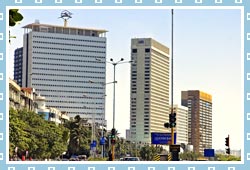 |
Contributions To Indian Economy
History Of Mumbai
Mumbai was formed as a result of amalgamation of seven islands namely: Bombay Island, Colaba, Mazagaon, Worli, Mahim, Old Woman's Island and Parel. The name Bombay, which meant 'Good bay', was given to these islands by the Portuguese. Initially, these islands were ruled by the Hindu dynasties and the Muslims, and were later gifted to Charles II as dowry when he got married to Princess Catherine de Braganza of Portugal in 1661. Followed by this, in 1668, Bombay was leased to the East India Company and under them, it began to emerge as a trade center, followed which the shipbuilding industry in Surat shifted base here. After the American Civil War, the Suez Canal was also opened, which paved way for the export of cotton from Bombay. During that time, Bombay was the capital of the 'Bombay Presidency', which later split into Gujarat and Maharashtra. Mumbai is also important from the point of view of the freedom struggle as the first Indian National Congress was held here in 1885. This city was renamed Mumbai in 1996 officially, in veneration to the local Koli Goddess, Mumbadevi.
Commercial Capital
Mumbai presents its people a throbbing and bustling commercial life as it houses the largest port of India, a colossal film industry along with two airports, numerous pubs, bars and restaurants and a major concentration of the textile industry. Obviously, Mumbai is regarded as the financial capital of the country. There are several landmarks in Mumbai, which attract tourists from all over the country and world. Mumbai tends to be one of the most desired tourist centres in India. This city is considered to be the central hub for trade, industries and business. The present scenario of Mumbai indicates that it is a growing center of media activities and advertising.
Contributions Of Mumbai In The Indian Economy:
Mumbai is home to the Hindi film industry, popularly known as Bollywood, which produces more than 900 movies a year. The range of Bollywood films with its techniques in melodrama, dance, action, songs and acting skills have conquered many hearts across the world and keep the viewers glued onto the screen for 3 hours. Often called the 'City of Hopes & Dreams', Mumbai is also the center of entertainment with Bollywood being the largest film industry of India.
Mumbai has been in the stages of outstanding development in terms of the financial and economic sector since 1991, after the liberalization of India. Do not miss any chance to visit the commercial capital of India and explore the commercial capital of India for yourself.